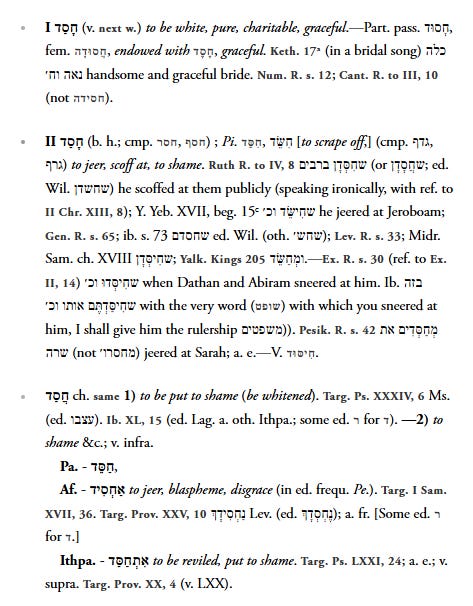In a recent daf, Sanhedrin 58b, we have statements that Kayin was permitted to marry his sister. Thus:
תָּא שְׁמַע: מִפְּנֵי מָה לֹא נָשָׂא אָדָם אֶת בִּתּוֹ? כְּדֵי שֶׁיִּשָּׂא קַיִן אֶת אֲחוֹתוֹ, שֶׁנֶּאֱמַר: ״כִּי אָמַרְתִּי עוֹלָם חֶסֶד יִבָּנֶה״. הָא לָאו הָכִי – אֲסִירָא.
Come and hear a proof from a baraita: For what reason did Adam not marry his daughter? So that Cain would marry his sister and they would procreate immediately, as it is stated: “For I have said: The world shall be built on kindness [ḥesed]” (Psalms 89:3). This verse alludes to the fact that at the beginning of the world’s existence it was permitted for men to marry their sisters, which was later forbidden in the verse: “And if a man shall take his sister…it is a shameful thing [ḥesed]” (Leviticus 20:17). The Gemara infers: If it had not been so, if God had not specially permitted Cain to marry his sister, she would have been forbidden to him. This is difficult according to the opinion of Rabbi Akiva, who deems it permitted for a gentile to marry his sister.
And continues, repeating almost the same derasha twice more.
The English Koren / Steinsaltz text translates this as “The world shall be built upon kindness”, which is the peshat meaning of the paskuk in its place. But, it explains the not-so-hidden derasha, that it is based on a verse in Vayikra that calls brother-sister incest chesed, shameful. Rav Steinsaltz wrote something akin to this, though not as explicitly, in his Hebrew commentary. That is, he tags the sin and verse, but does not translate the word chesed as “shameful thing”.
הוא שנאמר: "כי אמרתי עולם חסד יבנה" (תהלים פט, ג), שיש בפסוק זה רמז שבתחילת קיומו של העולם הותר לבני אדם לשאת אחיות, שהיא עבירה שנאמר עליה "ואיש אשר יקח את אחותו... חסד הוא" (ויקרא כ, יז).
And in his Hebrew iyunim, Rav Steinsaltz writes:
כדי שישא קין אחותו
ראה בתוס' ד"ה "מפני", הסבר אחר מה עניינו של חסד כאן. יש שפירשו שהחסד הוא שלא לקח אדם את בתו (שהיתה בעצם מותרת לו, כאמור), ולא המתין עד שתוולד בת לבתו שיוכל קין לשאתה בהיתר גמור, שעשה חסד עמו שיוכל לפרות ולרבות (רמ"ה, ר"נ).
Artscroll’s English translation does not nearly approach the idea in the Koren English, focusing just on the loving-kindness. That is because they draw from Rashi / are bound by Rashi. Rashi wrote
חסד יבנה - תחילתו של עולם נבנה בחסד שצוה אדם הראשון לגמול חסד את בנו ואסרה לו והתירה לקין כדי שיבנה העולם והיינו דכתיב (ויקרא כ׳:י״ז) (כי יקח איש) את אחותו בת אביו חסד הוא מה שהתרתי לקין חסד גמלתי עמו:
This comment assumes that chesed means loving-kindness, as in gemilut chassadim. Regarding Vayikra, “that which I permitted to Kayin thereby is chesed / kind granted to him.
If I were to try to explain the underlying derasha, I would say that the word חסד has two distinct word senses. And that they might even draw from different underlying roots:
Jastrow has two entries, but then in the Aramaic entry (ch. meaning Chaldean, same) connects shame with whitened.
Klein notes the two word senses and the possible distinct word origins.
To this, I would add one rabbinic meaning. Because of the relatively rare usage of the word chesed as “shameful thing” in that verse about brother-sister incest, and only there, it became a technical term in rabbinic Hebrew for brother-sister incest.
Therefore, ״כִּי אָמַרְתִּי עוֹלָם חֶסֶד יִבָּנֶה״ should be translated as “For I have said, ‘the world shall be built with [brother-sister] incest.” And then, because of the Divine imprimatur, it does not carry the sense of shame. It was really the only plan possible, if the early humans males were not to have their own spouses created from their own ribs, or mate with Neanderthals.




You've finally explained a pasuk to me that I have not understood!
וַיְהִ֞י כַּאֲשֶׁ֧ר הִתְע֣וּ אֹתִ֗י אֱלֹהִים֮ מִבֵּ֣ית אָבִי֒ וָאֹמַ֣ר לָ֔הּ זֶ֣ה חַסְדֵּ֔ךְ אֲשֶׁ֥ר תַּעֲשִׂ֖י עִמָּדִ֑י אֶ֤ל כׇּל־הַמָּקוֹם֙ אֲשֶׁ֣ר נָב֣וֹא שָׁ֔מָּה אִמְרִי־לִ֖י אָחִ֥י הֽוּא׃
So when God made me wander from my father’s house, I said to her, ‘Let this be the kindness that you shall do me: whatever place we come to, say there of me: He is my brother.’”
What kindness is this? But if there is another meaning to חסד... This makes sense. This is further confirmed by the fact that the Torah elides Sarai's genealogy, and the fact that the previous pasuk says
וְגַם־אׇמְנָ֗ה אֲחֹתִ֤י בַת־אָבִי֙ הִ֔וא אַ֖ךְ לֹ֣א בַת־אִמִּ֑י וַתְּהִי־לִ֖י לְאִשָּֽׁה׃
And besides, she is in truth my sister, my father’s daughter though not my mother’s; and she became my wife.